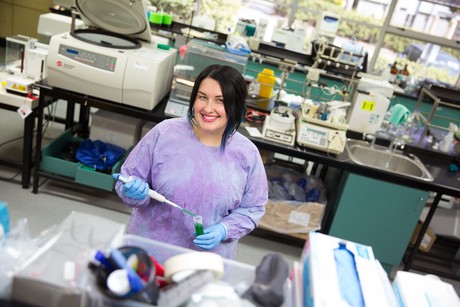Young Tall Poppies recognised during National Science Week

Nine outstanding young researchers from NSW have been recognised with Young Tall Poppy Science Awards as part of the Sydney Science Festival and National Science Week.
The Tall Poppy awards are run by the Australian Institute of Policy and Science (AIPS) to honour early-career scientists who combine world-class research with a passionate commitment to communicating science. The awards are held on a state-by-state basis to celebrate researchers across science, engineering and mathematics.
This year’s NSW winners showcase the diversity of research being carried out across the state — from discovering the workings of the smallest biological engine to the prediction of epidemics. As part of the Young Tall Poppy campaign, award winners will spend a year sharing their knowledge with school students, teachers and the broader community through workshops, seminars and public lectures.
The University of New South Wales was very well represented in the awards, winning five of the nine awards on offer. Awardees ranged from Dr Louis Wang, whose clinical research focuses on identifying factors which may assist early detection of heart failure, to Dr Matthew Baker, who uses synthetic biology to template and shape the assembly of one of the pinnacles of evolution: the bacteria flagellar motor.
Dr Jemma Geoghegan from Macquarie University was meanwhile recognised for her work in evolutionary dynamics and genetics of key viral infections affecting both human and animal health. Her research aims to reveal the drivers of virus diversity, ecology and evolution, including the virus-host interactions that lead to the infection of new host species and result in disease emergence.
Finally, University of Newcastle researcher Dr Emma Beckett was awarded for her work on gene-nutrient-environment interactions — how what we eat changes the way our genes are switched on and off, and how the genes we have change what we eat and how we respond to food. Studying these interactions is important, Dr Beckett said, because our genes, nutrition and environments all contribute to our risk of diseases, yet our nutritional recommendations are universal.
“These Tall Poppies join a strong tradition of scientific research and communication here in NSW,” said AIPS General Manager Camille Thomson. “They are already showing excellent promise and we are excited to see them become the guiding lights of science to future generations of enquiring minds.”
Vaxxas to advance its microarray patches for COVID vaccination
Vaxxas will receive AU$3.2m from BARDA to accelerate work advancing its high-density microarray...
Global competition targets 'undruggable' cancer protein
A new global competition offering over US$500,000 in prizes aims to spur drug discovery...
SMi Systems appoints Dr Ankur Mutreja as Senior Advisor
Mutreja was previously Head of Global South Partnerships at CEPI, where he was responsible for...




